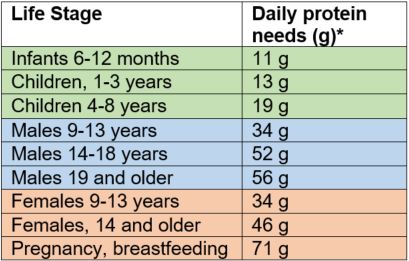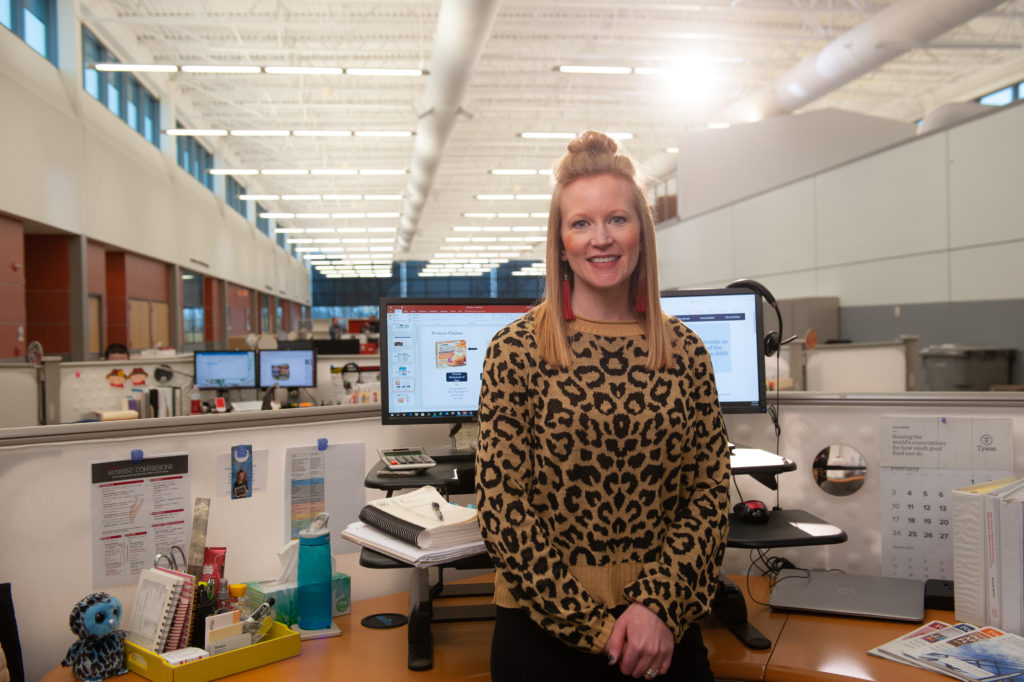I don’t know about you, but I’m constantly reading nutrition labels, because I want to know how much protein is in that chicken sausage or whether I should toss it together with some pasta or opt for steamed veggies to create a more balanced meal.
While I know there is a farmer out there who raised and cared for that protein on my plate, I rarely remember to think about all the steps in the journey from farm to family table, which includes the important work nutritionists do to enable us to better understand what we’re putting in our bodies.
Monica Stewart, one of our registered dietitian nutritionists at Tyson Foods, is part of that important work.
Our team of nutrition specialists and registered dietitian nutritionists create nutrition fact panels and provide nutrition data to customers. They provide scientific expertise in analyzing and interpreting nutrition research and maintain knowledge of federal regulations and corporate standards for nutrition labeling and product development, which sounds like a mouthful, but is actually pretty easy to understand when you break it down. How do I know? Because I sat down with Monica and picked her brain about nutrition, protein and more.
Q: Okay, I’m going to start out hot right out of the gate: a lot of people see dietitians as the “food police” or people who are just looking to “make you feel bad,” which is a total misconception. What do you think would be a better title that describes what you do with a more positive connotation?

Hmm, maybe Mind and Body Maven. Or, perhaps, Cuisine Counselor.
I would want my title to connect mind and body, rather than demand mind over matter, when it comes to food, because there’s no one-size-fits-all way to approach mindful eating. One of my roles is to teach people to listen to their own bodies’ needs. Paying attention to your body’s signals of hunger and fullness is so important, as well as being aware that food is not only about nourishing our bodies, but also about connecting us to our cultures and to other people.
I once heard a fellow dietitian say, “the more we know about food, the more we can eat,” and I instantly connected with this statement. As Mind and Body Mavens or Cuisine Counselors, dietitians can help encourage variety in the food we eat, not restraint, and help people make decisions they feel good about.
My personal philosophy is that food doesn’t have to be fancy or complicated. It can be a perfectly ripe piece of fruit, or a tender piece of meat. It doesn’t have to be complex to meet your needs or to be enjoyed. It’s not about “good” food or “bad” food, simply about balancing the foods you love.
After all, even desserts and treats have a nutrition label, so doesn’t that mean they were meant to be eaten? ?
Q: In your view, what’s key to a balanced diet?
Variety. Each food group delivers essential nutrients. If you’re not well-versed on the food groups or just don’t know where to start, I suggest using MyPlate as a guide to help you build a balanced plate.
Here at Tyson, the concept of variety is an important part of our portfolio. We have a variety of foods that can fit within most lifestyles. From personally sized snacks like Jimmy Dean Protein Packs and convenient breakfast options like Jimmy Dean Simple Scrambles to fresh or frozen Tyson chicken or Tyson 100% Whole Grain Breaded Chicken Breast Chunks. All these items can fit into a balanced diet by pairing them with other foods to meet your nutrient needs.
For example, a frozen breakfast sandwich like Jimmy Dean® Breakfast Delights contains dairy, grains and protein food groups. You can add a serving of fruit to round out your breakfast meal or add a serving of fruit and vegetables if you’re having breakfast for dinner!
Q: Are there any common misconceptions about protein when it comes to how much, how often and the type we consume?

There is a misconception that protein intake should decrease as people age. The opposite is true. Protein is critical throughout our life cycle. As we age, even as early as our 30s, our bodies begin to lose muscle and function. Having protein in our diet is essential in helping to minimize muscle loss.
Another misconception when it comes to protein is focusing on how much you consume rather than how often you consume it. According to U.S. eating patterns, a lot of Americans are getting adequate protein in their diet, but it’s not distributed evenly throughout the day. Typical eating patterns show dinner containing our largest protein contributing meal. Research suggests a more balanced approach to protein consumed throughout the day may be beneficial for improvements in appetite and body weight management.
One final misconception is around the role red meat can play in the diet. A 3-ounce serving of lean beef provides a variety of key nutrients including: protein, zinc, vitamins B12, B6 and iron, all of which are essential for health.
Overall, shifting your daily protein choices to incorporate nutrient-dense foods, including lean meats and lower sodium options and eating a variety of protein foods, like eggs, seafood, legumes, and nuts, will help meet your protein needs and can help support an overall healthy eating pattern.
Q: We know that consumers are gravitating toward a more “flexible” diet by incorporating more plant-based or alternative proteins. What’s your view on the benefits of adding plant-based or alternative proteins into the mix of a primarily animal-protein-focused diet?
I embrace these alternatives and think there is room at the table for both. I feel like it’s not about “either/or” and totally about “yes, and.” Plant proteins are a perfect fit in the Tyson Foods protein portfolio, which has recently expanded with the new Raised and Rooted brand, which includes nuggets made with plant protein and Angus beef patties blended with plant proteins.
There are benefits of incorporating both types of protein into your diet. With plant proteins like beans, some grains and nuts, you’ll get protein and fiber, while animal protein provides essential Vitamin B12 and iron.
All protein is made up of 20 amino acids, with nine considered to be essential, meaning our bodies can’t make them, so we have to get them from food we eat. Animal protein is unique in that it supplies all nine of those essential amino acids in correct proportions, while plant proteins (except for soy), are missing one or more of those amino acids the body needs. With both supplying different nutrients, in addition to different amino acids, this reinforces the need for variety and balance in the diet to get all the nutrients you need.
Q: Back to reading nutrition labels, any advice on understanding label claims?
When you’re scanning products in the meat case or freezer aisle, you’re likely to see claims like “organic,” “natural,” or “no antibiotics.” Sometimes, it’s a process that seems to require a decision tree to unlock the puzzle: “if this, then what?” If you start feeling that way, take a step back and review some key resources to help you understand what these claims mean and how they’re regulated.
All meat and poultry label claims are established and governed by the U.S. Department of Agriculture (USDA), specifically within the agency of Food Safety and Inspection Service (FSIS). FSIS is responsible for “ensuring the truthfulness and accuracy in labeling of meat and poultry products.” Before a product’s label can be approved, FSIS must evaluate and review claims for accuracy. Through federal regulations and premarket approvals, USDA determines what claims can (and cannot) be used on packages.
I encourage you to visit the USDA’S WEBSITE to learn exactly what these mean. You can even keep this page pulled up on your phone to reference whenever you’re in the store.






1 Comment
Leave A Comment